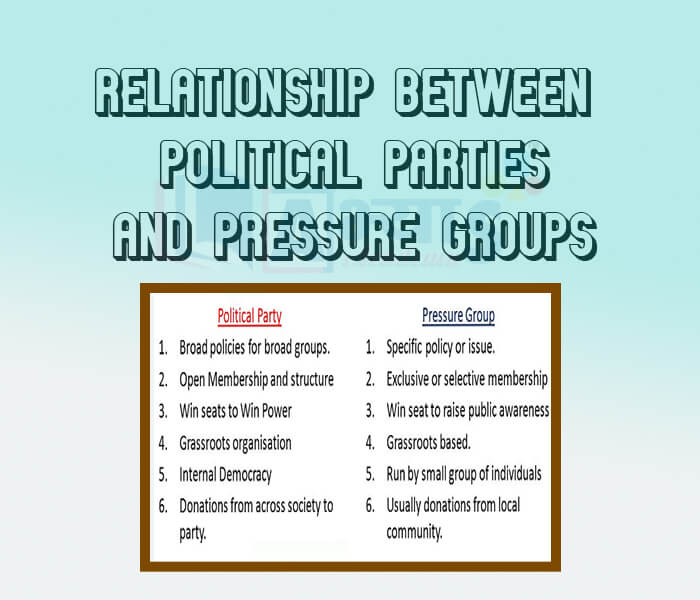Relationship Between Political Parties And Pressure Groups













Relationship Between Political Parties And Pressure Groups
Relationship Between Political Parties and Pressure Groups: The relationship between political parties and pressure groups can take different forms. Some are direct and others are indirect.These are
Is the Influence of Pressure Groups Healthy? It may initially appear that it is not healthy for groups that promote interest of one section to have influence in democracy. A democracy must look after the interests of all, just one section. Also, it may seem that these groups wield power without responsibility. Political parties have to face the people in elections, but these groups are not accountable to the people. Putting pressure on the rulers is not unhealthy activity in democracy. Public interest groups and movements perform a useful role of countering undue influence and reminding the government of the needs and concerns of ordinary citizens.
It is impossible for one single group to achieve dominance over society in the presence of different groups. A pressure put by a group on the government to make policies will be countered by another group. The government gets to hear about what different sections of the people want. Ultimaltely, this leads to a rough balance of power and accommodation of conflicting interests.
Students / Parents Reviews [10]
Being a parent, I saw my daughter improvement in her studies by seeing a good result in all day to day compititive exam TMO, NSO, IEO etc and as well as studies. I have got a fruitful result from my daughter.

Prisha Gupta
8thMy experience with Abhyas is very good. I have learnt many things here like vedic maths and reasoning also. Teachers here first take our doubts and then there are assignments to verify our weak points.

Shivam Rana
7thOne of the best institutes to develope a child interest in studies.Provides SST and English knowledge also unlike other institutes. Teachers are co operative and friendly online tests andPPT develope practical knowledge also.

Aman Kumar Shrivastava
10thAbhyas is a complete education Institute. Here extreme care is taken by teacher with the help of regular exam. Extra classes also conducted by the institute, if the student is weak.

Om Umang
10thI have spent a wonderful time in Abhyas academy. It has made my reasoning more apt, English more stronger and Maths an interesting subject for me. It has given me a habbit of self studying

Yatharthi Sharma
10thIt was good as the experience because as we had come here we had been improved in a such envirnment created here.Extra is taught which is beneficial for future.

Eshan Arora
8thA marvelous experience with Abhyas. I am glad to share that my ward has achieved more than enough at the Ambala ABHYAS centre. Years have passed on and more and more he has gained. May the centre flourish and develop day by day by the grace of God.

Archit Segal
7thIt was a good experience with Abhyas Academy. I even faced problems in starting but slowly and steadily overcomed. Especially reasoning classes helped me a lot.

Cheshta
10thMy experience was very good with Abhyas academy. I am studying here from 6th class and I am satisfied by its results in my life. I improved a lot here ahead of school syllabus.

Ayan Ghosh
8thMy experience with Abhyas academy is very good. I did not think that my every subject coming here will be so strong. The main thing is that the online tests had made me learn here more things.
